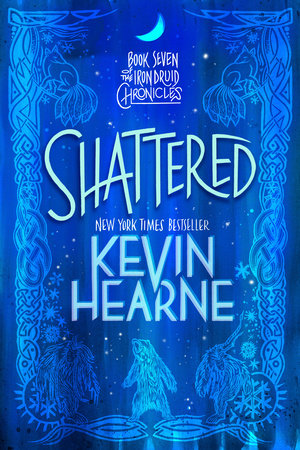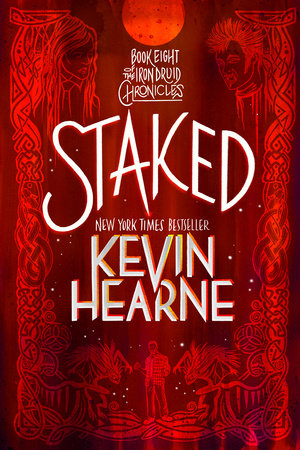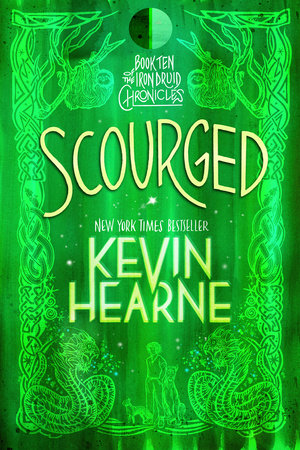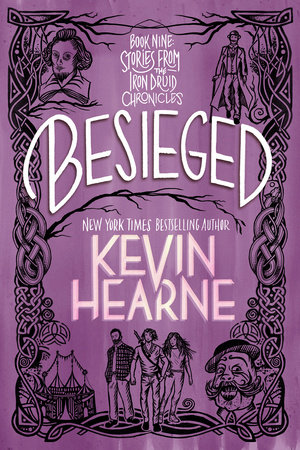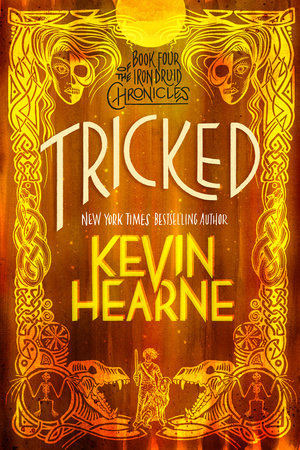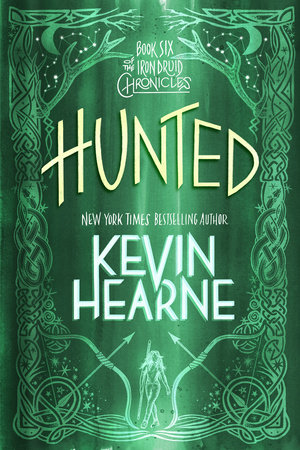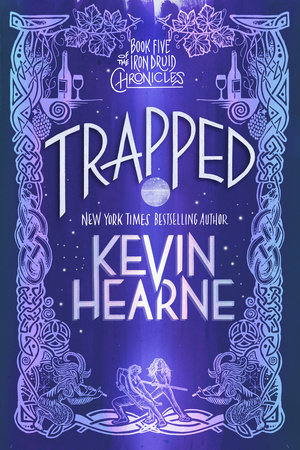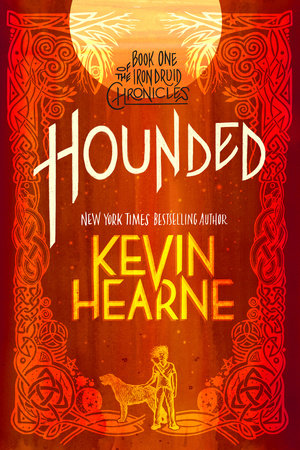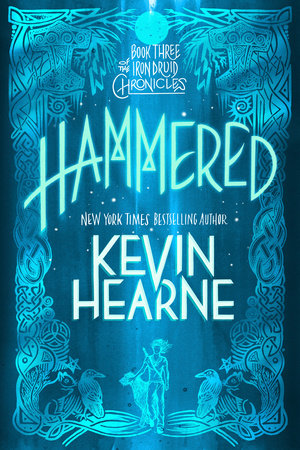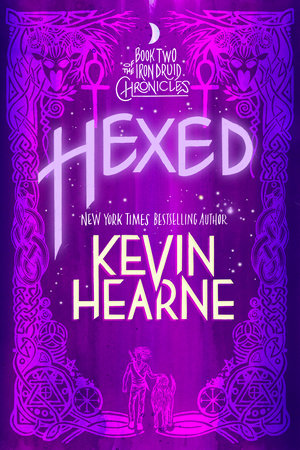Excerpt
Shattered
Chapter 1
Few things trigger old memories so quickly as authority figures from our youth. I’m not saying those memories are necessarily good ones; they’re simply old and tend to cast us back into roles we thought we grew out of long ago. Sometimes the memories are warm and blanket us like a mother’s love. More often, however, they have the sting of hoarfrost, which bites at first, then numbs and settles in the bones for a deep, extended chill.
The ancient man who was pushing himself up into a sitting position in front of me triggered very few memories of the warm sort. Apart from being brilliant and magically gifted, my archdruid had frequently been abusive and had made few friends during his life—a life that, until recently, I thought had ended millennia ago. After he bound me to the earth prior to the Common Era, I’d seen him only a couple more times before we drifted apart, and I’d always assumed he’d died, like almost everyone else I knew from my youth. But for reasons unknown, the Morrigan had frozen him in time in Tír na nÓg, and now he was about to confront the fact of his time travel—with, I might add, flecks of spittle and bacon around the edges of his wrinkled lips.
I hope that if I ever travel two thousand years into the future, there will still be bacon.
His voice, a sort of perpetually phlegmy growl, barked a question at me in Old Irish. He’d have to learn English quickly if he wanted to talk to anyone besides the Tuatha Dé Danann and me. “How long was I on that island, Siodhachan? You still look pretty young. By the looks of ye, it can’t have been more than three or four years.”
Oh, was he in for a surprise. “I will tell you in exchange for something I’d like to know: your name.”
“My name?”
“I’ve never called you anything but Archdruid.”
“Well, it was right that ye should, ye wee shite. But now that you’re grown a bit and a full Druid, I suppose I can tell ye. I’m Eoghan Ó Cinnéide.”
I grinned. “Ha! If you Anglicize that, it’s Owen Kennedy. That will work out just fine. I’ll call Hal and get you some ID with that name.”
“What are ye talking about?”
“That’s a question you’ll be asking a lot. Owen—I hope you don’t mind me calling you that, because I can’t walk around calling you Archdruid—you’ve been on that island for more than two thousand years.”
He scowled. “Don’t be tickling me ass with a feather, now; I’m asking seriously.”
“I’m answering seriously. The Morrigan put you on the slowest of the Time Islands.”
Owen studied my face and saw that I was in earnest. “Two thousand?”
“That’s right.”
He flailed about for something to hold on to; the number was too huge to register, and the stark fact that he had been uprooted and could never go back to his old earth was a deep, dark well into which he could fall forever. He opened his mouth twice and closed it again after uttering a half-formed vowel. I waited patiently as he worked through it, and finally he latched on to me, having nothing else in front of him. “Well, then, you were on one of those islands too. She must have set us there around the same time.”
“No, I didn’t get to skip all that time in an eyeblink. I lived through it. And I’ve learned a few things you never taught me.”
He grunted in disbelief. “Now I know you’re pulling me cock. You’re telling me that you’re more than two thousand years old?”
“That’s what I’m telling you. You might as well brace yourself. The world is far bigger and far different than it was when you left it. You’ve never even heard of Jesus Christ or Allah or Buddha or the New World or bloody buffalo wings. It’s going to be one shock after the other.”
“I don’t know what a shock is.”
Of course he didn’t. He’d never heard of electricity. I’d thrown in a modern Irish word with my Old Irish.
“But your lack of hair is certainly a surprise,” he said, gesturing at my close-cropped skull. It was starting to fill in from when I’d had to shave it all off—a consequence of a recent encounter with some Fae who’d tried to chew off my scalp—but to Owen’s eyes it must look like an unnatural cosmetic decision. “And what in nine worlds happened to the rest of your beard? Ye don’t look like a man. Ye look like a lad who had a rat die on his chin.”
“It works for me,” I said, dismissing it. “But look, Owen, I’m wondering if you can do me a favor.”
“Do I owe ye one?”
“You’d still be on that island if it weren’t for me, so I’d say so.”
My archdruid huffed and wiped at his mouth, finally dislodging the bacon bits that had rested there. “What is it?”
I raised my right sleeve over my shoulder, revealing the ravaged tattoo at the top of my biceps. “A manticore destroyed my ability to shape-shift back to human, so I can’t shift to any of my animal forms until it gets fixed. Would you mind touching it up?”
He scowled and flared up. “I fecking taught ye how to tame a manticore, didn’t I? Don’t try to tell me I didn’t! That isn’t my fault.”
“I didn’t say—”
“And I remember ye complaining about it too.” He affected a falsetto to mock me. “ ‘When am I ever going to meet a manticore?’ ye said. ‘Why do I have to learn Latin? When are we going to learn about sex rituals?’ ”
“Hey, I never said that!”
“Ye didn’t have to. There was a year ye couldn’t sneak up on anyone because your knob would peek around the corner first and everyone would say, ‘Here comes Siodhachan!’ and then the rest of ye would follow. Ye remember that?”
Desperate to return the conversation to more-recent scars— a much safer topic than my uncomfortable puberty—I said, “The manticore struck first, and taming him was never an option.”
“It’s always an option.”
“No, it’s not. You weren’t there, and you’ve never had to deal with manticore venom. It requires all of your attention to break it down, trust me. And once I managed to do it, I was so weak that I’d never have been able to survive another dose. I was severely wounded and unable to confront him without leaving myself open to another shot. Any attempt to tame him would have been fatal. I was lucky to get out of there alive.”
“All right, fine, but why me? Can’t ye have some other Druid do it? I have some catching up to do.”
I carefully neglected to mention that he and I were two of only three remaining Druids in the world. Time enough for that later. “That’s true, you do. We have a lot to talk about, and I have a new language to teach you if you’re going to get along. And the other Druid I’d trust to do this is busy working on another project.”
Granuaile was training her new wolfhound, Orlaith, to speak and was also taking care of Oberon in the meantime. I didn’t want her talking to Owen anyway, until I’d had the chance to teach him modern manners. If he spoke to her the way he spoke to me, there would be blood in short order, most of it his.
My archdruid winced, sighed, and rubbed at his temples as if he had a major headache. “Dagda fuck me, but I need something to drink. I don’t suppose ye know where we can find something besides water?”
“Sure. I’ll buy. Can you walk yet?” I glanced at his legs, which had been broken in the stress of removing him from the Time Island. He’d had some time to heal here, under the ministrations of the healer Fand, Manannan Mac Lir’s magic bacon, and his own healing powers, but I didn’t know if it was enough.
“I think so.” He nodded. “Bones bind quickly, but it’s the bruising to your muscles that always takes time. We’ll walk slow and drink fast.”
He leaned on me a bit for support and walked gingerly, but we made it off the barge and into the boat I’d taken out to the island. Once we reached the riverbank, it would be a short walk to a tree tethered to Ireland. We’d be able to shift to someplace with plenty of potables on tap and a comfortable spot to talk. In a strange way, I was looking forward to it. It felt strangely empowering to know something my archdruid didn’t already know.
Somebody didn’t want us to have that talk, however. No sooner had the boat ground into the gravel of the bank than an angry, high-pitched bark greeted us from downriver.
“Oi!” A hopping-mad Fir Darrig bounded toward us—literally hopping and literally mad, as evidenced by the bulging of his eyes and the belligerent brandishing of his shillelagh—intent on accosting us at the least and teeing off on our skulls at the worst. Rat-faced, red-coated, and only three feet tall, Fir Darrigs have a five-foot vertical leap and a quick hand with the shillelagh; their single-digit IQs couple with that to make them think they are eight feet tall and four times as fearsome.
Usually you can just toss something shiny at them and they will stop to investigate, because they’re greedy little goblins and tend to hoard anything that appears valuable. I had a quarter in my pocket and I lobbed it at him, making sure it caught the sun, but his eyes never wavered. He was determined to take a swing at me for some reason.
Another one bounced out of the trees downriver, spied us, and leapt forward. “Oi!” A second later, three more appeared. “Oi! Oi! Oi!”
“That’s fecking strange,” my archdruid said. And he was right. Fir Darrigs are typically solitary. You’d see two of them slamming their fists into each other every so often, which was actually their mating ritual, and if they didn’t kill each other first, eventually they’d slam other things into each other and carry on the species. I’d never seen three together before, and here we had five coming at us.
“Oi! Oi! Oi!” Whoops. Make that eight.
The first one was obviously the most immediate threat, so I crafted a binding between the wool of his natty red coat and the silt of the riverbank and let the earth pull him to the ground. I wasn’t quick enough to bind the coat closed, however, and he wriggled out of it and came at us nude, because Fir Darrigs don’t wear anything except those red coats. He was filthy and ugly, and his yellow choppers gnashed out a series of incoherent snarls. Belatedly, I realized it would have been a better choice to bind his shillelagh to the riverbank. I drew my sword, Fragarach, from its scabbard and stepped forward, setting myself; there would be little time for other bindings.
Behind me, Owen began to tear off his ragged tunic and pants. He had no weapon; he was a weapon when he shape-shifted to his predator form.
“Stand back, lad, I can handle this.”
I shot a quick scowl at him over my shoulder. “You’re not in any shape to fight.”
That fired him up, and he spat at me, “When a fight comes at ye, it’s not going to ask if you’re in shape for it! Ye have to be ready whenever it comes, and the day I’m not ready for a fight is the day I’m dead!” Free of his clothes, he shape-shifted to an enormous black bear and roared. That secured the attention of the first Fir Darrig, which roared back, hopped out of my reach to the left, then leapt up high in an arc that would end with his shillelagh crashing down onto Owen’s skull. I turned and pursued like someone chasing down a Frisbee. Owen attempted to rise up on his back legs to meet the Fir Darrig, but those were the ones that had been broken and they weren’t sufficiently sturdy to support a bear’s weight yet. He got halfway up before they buckled and he came back down. The Fir Darrig had adjusted his swing to meet Owen’s head up high but then couldn’t recalculate in time once the bear fell to his feet. His feeble effort glanced off the top of Owen’s shoulder but skipped along on the follow-through to clock him on the ear. It staggered Owen, and he bellowed as he reeled sideways, but the Fir Darrig never got another chance to swing. I caught up and shoved Fragarach quickly through his neck; as he fell, I turned to meet the other seven.
The leader was still forty yards away, and they strung out from there. About five seconds to impact if I waited for them to come to me, less if I went to meet them. Owen was still shaking off the first club to the head and probably wouldn’t see the next shillelagh that brained him if I let them get close enough to take another swipe. So I charged, making plenty of noise to ensure they focused on me rather than the big bad bear. Owen wasn’t ready for this, no matter what he said.
Sword held high as I went in, I slid low at the last moment, upending those who didn’t leap up in an attempt to strike from the sky. The jumpers completely overshot me, but I wound up with three Fir Darrigs draped across my body, and once they came into contact with my cold iron aura, they were doomed as creatures of magic to death by disintegration. I didn’t even have to slap them; they gave a startled cry as their substance unraveled and thumped the air inside their coats with a plosive cloud of ashes.
Scrambling to my feet as the final four landed and whirled around, I brought up Fragarach to defend my head from their next attack. One of them, the smallest and most agile of a small and agile group, had already launched himself at my midsection as I was turning to face them, catching me off-balance and plowing me back to the sandy gravel of the riverbank. He had puffed away into the wind by the time I hit the ground, but he’d set me up to be pounded to putty by his mates. They weren’t bright; instead of approaching from the side and smashing down as if they were chopping wood, they jumped on top of me to keep me down and raised their shillelaghs high. Their clawed toes scratched me, and their heels knocked the wind out of me, but they got the worst of it. They came apart before they could swing, and the only wounds I suffered were from three shillelaghs and three foul red coats that fell on top of me. I coughed from the ashes in the air and checked on Owen, who was closer than he had been but still twenty yards away from the action. His ears were up, and his eyes were wide in an expression of ursine surprise.
The archdruid didn’t give me any thanks for saving his hide or even comment that I had done well to take out eight Fir Darrigs all by myself. Fortunately, due to long acquaintance with him, I didn’t expect either thanks or praise.
“What did ye just do?” he said upon shape-shifting back to human, his breathing somewhat labored. “They had ye all laid out for killing and then they exploded! Ye could have left me a couple.”
I stood up, dusted myself off, and tapped my necklace. “One of the reasons I’m still around—koff!—is this amulet. It’s cold iron and I’ve bound it to my aura, mostly for magical protection. But a useful side effect is that my aura kills Fae on contact. They call me the Iron Druid because of it.”
“You’re wearin’ cold iron? And you can still cast bindings?”
“Aye. It took some experimentation, but the mass is low enough to permit it.”
Owen grunted and waggled a finger at the rest of my necklace. “What’s all that silver on either side?”
“Charms. They let me cast basic bindings with mental commands rather than using my voice. It’s faster. Gives me an edge.”
He grunted again and considered. “All the Druids are doing this now?”
“Just me. But that’s pretty much all the Druids.”
“What?” My archdruid’s eyebrows, wild and white affairs that could do double duty as household dusters, drew together and folded his skin into grooves on his forehead.
“Not counting the Tuatha Dé Danann—and we can’t really count them, because they’re supposed to stay in Tír na nÓg as much as possible—there are only three Druids left, including us.”
“Shut your hole. How is that possible?”
“The Romans came for us. They burned all the groves on the continent and hunted us down. We couldn’t shift planes and so they were able to trap us. You heard about it, I’m sure. Julius Caesar was in Gaul in your day.”
Owen stiffened. “Aye, I remember. Did the Romans take Ireland?”
“No, they never made it there.”
“Well, then, why are there only three Druids?”
“Because the pagan Romans eventually turned into Christian Romans. The Holy Roman Church did make it to Ireland, centuries later, and a man named St. Patrick converted much of the populace to his religion. The Druids died out for lack of apprentices.”
He slumped, not understanding everything I said but sifting it for the essentials. “All the Druids died but you, eh? If this isn’t all an elaborate joke—and if it is, I will ask Ogma to help me pound the living shite out of ye—how did ye manage to live on when all the others died?”
“I left Ireland a long time ago, at the Morrigan’s urging, and learned to keep my body youthful. I’ve seen the world, Owen. It’s much, much bigger than we ever thought back in our time. To the rest of the world today, Ireland is a tiny country, famous for its fighters and its alcohol.”
“How tiny?”
“If the world were nine hundred sheep and a billy goat, Ireland would be the goat.”
“Huh.” He paused for a moment, trying to grasp the scale of it and orient himself, but it didn’t add up for him. He looked at me through squinting eyes. “Still, lad, why so few? With two thousand years to work with, I’d imagine ye would train more than one apprentice.”
“I was being chased by Aenghus Óg for much of that time.”
“Oh, him. For a god of love, he’s sure quick to hate and be hated back. He’s a right bastard.”
“He’s a dead bastard. I killed him.”
He raised a finger and tilted his head. “Is it the truth you’re telling me now, Siodhachan?”
“Aye. And as soon as he was dead, I began to train an apprentice. I just finished binding her to the earth a little over a month ago.”
“Ah, ye did? What’s her name?”
“Granuaile.”
“When do I get to meet her?”
“Later,” I said. “We need to get you acclimated first. The world is so different that I’m worried you’ll withdraw and hate everything.”
“There’s little chance of that,” Owen said, a tiny grin tugging at the corners of his mouth. “I can’t wait to see it all, to be truthful. And I’m sure the basics are the same. People still eat and shite and sleep, right?”
“Well, yes.”
“Then it can’t be all that different, can it? We’ll just have to train some more Druids.”
“I suppose so. But I have to caution you that there will be plenty of adjustments to make. We can start adjusting over a pint or five.” It occurred to me that he might not know what a pint was, so I added, “Ready for that drink?”
“Aye. But I should probably put me clothes on again.”
We shifted planes to Ireland—to the Kilkenny Castle grounds, actually, where there were some bound trees along the canal. From there I led him through the streets to Kyteler’s Inn, a gray stone structure established in 1324. The interior would still be a jarring experience for him, but at least it wouldn’t have giant plasma screens shouting about the latest football match. I expected a flood of questions on the way, especially once he saw the castle, but he didn’t speak the whole way there; instead, he looked around with his mouth gaping open, staring at cars and streets paved in brick, stone, and asphalt, and at the concrete and steel of modern architecture mixed with the mortar and stone of older days. He stared at people too, whose clothing and shoes he found perplexing. The archdruid received more than a few stares of his own. No one made rags like the ones he was wearing anymore.
The bartender gave us an uncertain welcome. I must have looked like a university student buying a homeless man a drink. I pointed to an empty table where we would sit.
“Two Jamesons, neat, and two pints of Guinness, please?” I asked.
“Right away, sir.”
Owen slid cautiously onto the upholstered chair after watching me do the same, his expression a mask of wonder at the feeling of padding. But horror suffused his face shortly afterward as he remembered what he’d seen on the way in, and he whispered his first words to me in the modern world, hunched low over the table. “They’ve covered up the earth, Siodhachan!”


